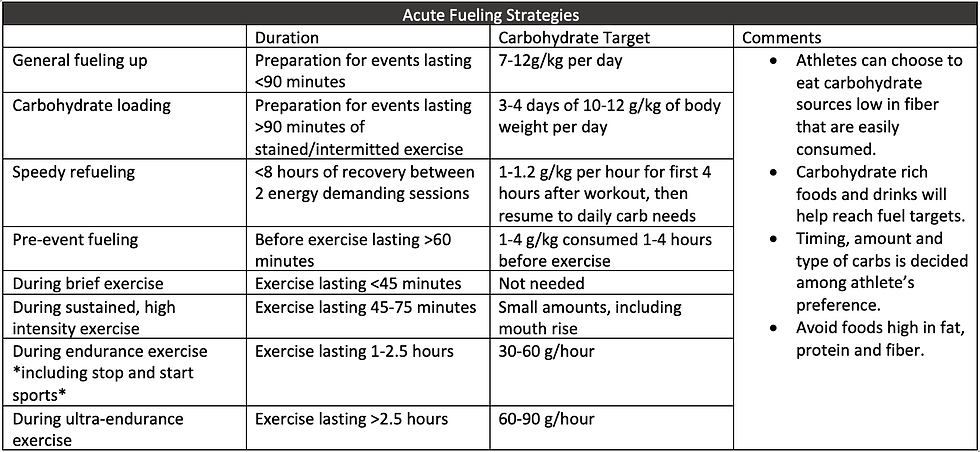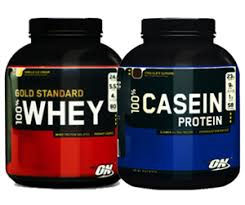Carbohydrates - The Body's Main Fuel Source
- schmidttm6
- Oct 15, 2020
- 3 min read
Carbohydrates are the main fuel source of the body. As an athlete, you need to fuel your body with carbs in order to have enough energy for a workout. What happens with carbs after we eat them? Carbohydrates are broken down in glucose and stored in the body as glycogen. When you begin training, the stored glycogen is used as fuel. After training, you need to replace those glycogen stores to help you recover and prepare for your next workout and daily life activities.
Carbohydrates are an intricate topic, so I'm going to make it easier to understand. What we're going to focus on are simple carbohydrates and complex carbohydrates. Simple carbohydrates have a high glycemic index and are made up of shorter chains of sugar molecules, which means they can be broken down quickly, allowing for a quick burst of energy. Complex carbohydrates have a low glycemic index and are made up of longer chains of sugar molecule, so they are broken down slower and provide long-lasting energy. Understand that a low glycemic index doesn't necessarily mean a food is nutrient dense; however, it's a fairly good source when trying to decide between certain foods, such as white pasta vs. whole grain pasta.
Glycemic Index (GI): the measurement of how quickly food raises blood sugar levels after consumption


Table provided by Dr. Peg Johnston RDN
Simple carbohydrate and complex carbohydrate foods
Simple carbohydrate foods are found in processed foods and refined grains, such as white flour, bread, pasta and rice. Refined grains go through a process that removes 1/4 of the protein and 2/3 of the nutrients. This is why you want to get over half of your carbohydrates from whole foods. Fruits are also considered simple carbohydrates, but are important to eat because they are full of nutrients.
Complex carbohydrate foods are found in whole grains, such as whole grain rice, 100% whole grain or whole wheat bread, 100% whole grain pasta, whole grain/wheat flour, potatoes, beans/legumes and vegetables. It's recommended that over half of your carbohydrates to be complex carbs. This will improve your health, resulting in an improvement in athletic performance.
Click here to learn the difference in whole grains and refined grains in greater detail.
When to consume simple carbohydrates and complex carbohydrates
Simple carbohydrates, preferably a whole food such as fruit, should be consumed at breakfast and 45 minutes after training (1, 2). You should try to consume complex carbohydrates at each meal. For some athletes, eating immediately after training may not settle well. If that's you, try to eat within 2 hours after training (2). Muscle glucose synthesis is more rapid if simple carbohydrates, preferably fruit, are eaten after exercise. You should eat complex carbohydrates 1-4 hours before a training session. Everyone is different so experiment with what your body needs.
Personal Tip: I've found that a combination of simple and complex carbs is what feels best on my stomach and eating 1.5-2 hours before a workout fuels me best.
How many carbohydrates do I need?
DISCLAIMER: Not all athletes require the same amount of macros. Your macros will vary depending on body weight/composition, intensity level, duration of training and training cycle. This does not ensure that you will lose fat, maintain weight or gain muscle. For best results, it's suggested to eat every 3-5 hours over multiple meals (3).Take a look at the images below to get a generalized idea of how many grams of carbohydrates you should be consuming. Remember, not everybody will react the same to carbohydrate consumption. If you feel as though you don't have much energy for practice, condition/lifting or competition, try to adjust your carbohydrate macros to fit your energy needs.


"Table 2. Summary of guidelines for carbohydrate intake for athletes" (3)
Pounds (lb) to Kilograms (kg) Conversion Equation:
Body weight (lb) ÷ 2.205 = Body weight (kg)
Calculation Example: 135 lbs soccer player performing at a moderate intensity level
135 lb ÷ 2.205 = 61.2 kg
Daily need for fuel and recovery: 5-7 g/kg/day (athlete should experiment to find what makes them feel best)
61.2 kg x 6 g = 367 g of carbohydrates
Calorie calculation: 367 g x 4 = 1,468 calories from carbs
Split up your calculated grams of carbohydrates into 4-6 meals (every 3-5 hours), emphasizing more carbohydrates at your pre-workout meal (3).
Sources
Ivy, J. L. (2004). Regulation of muscle glycogen repletion, muscle protein synthesis and repair following exercise. Journal of Sports and Medicine, 3, 131-138.
Pramukova, B., Szabadosova, V., & Soltesova, A. (2011). Current knowledge about sports nutrition. Australasian Medical Journal, (4), 3rd ser., 107-110. doi:10.4066/AMJ.2011.520
Thomas, T. D., Erdman, K. A., & Burke, L. M. (December 2015). Nutrition and Athletic Performance. Medicine and Science in Sports and Exercise. 543-568. doi: 10.1249/MSS.0000000000000852
.png)



Yorumlar